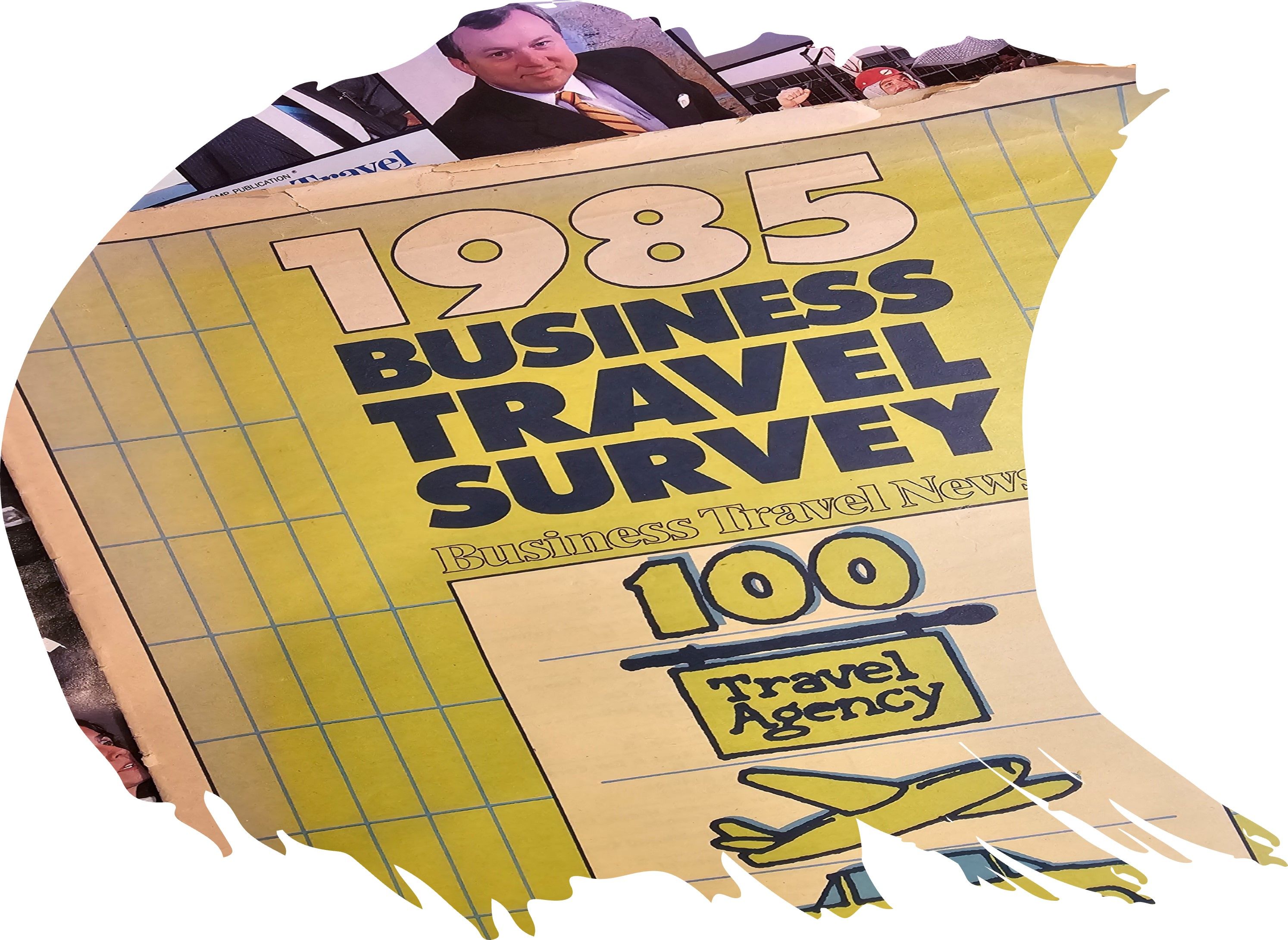
1985 was a pivotal year for travel. Corporate travel
structures, in particular, were coalescing around some of the traditional
entities the industry still operates through today.
The timeline that runs through this article cites a number
of industry developments that raised my curiosity about 1985, but that curiosity
was hard to satisfy. The truth is that the timeline featured here is nearly all that
is left in BTN’s archive for 1985, unless there is a box we missed when
searching through our storage facility in Rutherford, NJ, where the total oeuvre
landed after a quick pandemic-era purge of BTN’s New York office. We will
continue to look for these issues, and I’ll keep you updated when we find them.
(Same is true for 1986, but we pick up strong in 1987, so don’t worry.)
Let’s take a look at those key points in the timeline that piqued
my inner Nancy Drew girl detective instincts.
__________________________________________________________________________
Credit: BTN recreated this timeline from a list of industry events compiled by editors of BTN's 1989 fifth anniversary retrospective: Jim Alkon, Jeanette Borzo, Judi Bredemeier, Mary Brisson, Barbara Cook, Richard D'Ambrosio, Shann Davies, Larry Kilman, David McCann, Laura Koss, Don Munro, Imitiaz Muqbil, Jody Oesterreicher, Magdalene Ruzza. Thanks guys!
__________________________________________________________________________
.jpg) Click image to enlarge
Click image to enlarge
First, in January, the U.S. Department of Justice approved
the formation of Airlines Reporting Corp. ARC, in many ways, is the successor
organization to what was once the Air Traffic Conference, which was the entity
that granted travel agencies the authority to sell—and earn commissions on—airline
tickets. Prior to 1980, ATC also set those commission rates. A decision by the Civil Aeronautics Board in 1980 determined set commissions were anti-competitive and as of February that year airlines were able set their own commissions with agencies. That rate ultimately landed by 1985 at 10 percent for full-service agencies, but not for corporate travel offices, which were limited to 3 percent.
Second, the National Passenger Traffic Association
(precursor to National Business Travel Association and, then of course, today’s
GBTA) in May purchased a travel agency to support what was known then as corporate
travel offices “to control their own destiny” in terms of selling airline tickets and earning commissions. According to BTN reporters in 1985, NPTA also wanted a seat on ARC's agency advisory board, which would have helped embed corporate travel interests in the new power center. NPTA's agency purchase would have put it in the position of being eligible for such a seat. However, ARC denied NPTA that position with the new
organization due to “many airlines long-standing policy not to appoint
corporate travel departments as sellers of airline tickets,” according to BTN reporters at the time.
.jpg)
Third, Continental Airlines in September settled a dispute
with Lifeco, which was a specialized travel agency that helped power ticket
sales via corporate travel offices. The carrier accused Lifeco of claiming 10
percent commission for corporate travel offices. This was, at the time, the going commission rate set by airlines for authorized full-service
travel agencies. Corporate travel offices were generally limited by airlines to 3 percent. Continental backs
off from dropping Lifeco as a ticket agent.
Fourth, and also in September, ARC repealed its mandatory
agency classification system in a move that upgrades many agencies that were
currently classified as ‘in-plants’ to full-service agency status.
.jpg)
Seriously, what’s going on here?
To be honest, without BTN
to help me, it has been pretty hard to figure it out. I found myself rooting around through scholarly
journals about government regulation of the travel industry, scraping screens of archived Chicago Tribune articles, leveraging my New York Times subscription for some crumbs there and carefully picking my way though a handful of pretty
sketchy old web pages.
What I found were some lawsuits, for sure. More fundamentally, however, we
are looking at an industry grappling with the imminent shutdown of the Civil
Aeronautics Board coupled with a simultaneous trigger that deregulated,
on Jan. 1, 1986, which entities are authorized to sell and earn commissions on
airline tickets.
[Spoiler alert on much of this: Airlines would scrap agent commissions within 10 years, but no one knows that at this point.]
With the sunsetting of the Air Traffic Conference and the
formation of Airlines Reporting Corp., there’s an opportunity at hand to exert
influence on the way the overall travel industry—particularly as they relate to agencies and corporate travel departments—will develop.
Corporate travel offices as represented by the NPTA see themselves as having been disadvantaged in the commission mix. While these departments are playing a similar role as an agent, when it comes to ticket sales for their organizations, they earn zero to 3 percent commission as limited by the airline community.
A seat on the agency advisory board of ARC would allow corporate travel offices to represent their interests and relative buying power in the industry. NPTA's decision to purchase an ARC-authorized travel agency as potential gateway to that board seat makes a lot of sense. But the NPTA agency purchase "fizzles" according to the BTN timeline authors.
The events in September make me think there may have been diminishing reasons for NPTA to purchase an agency. The Continental v. Lifeco suit circles around commission issues. The companies settle the dispute. I can find zero information about the terms of that settlement, but I do know what doesn't happen. Continental stops short of dropping Lifeco as a ticketing agent.
There could be lots of reasons for this, primarily that the
agency sells a lot of tickets and Continental wouldn't have wanted to lose that
outlet. Lifeco, afterall, is the 7th largest travel agency in the U.S. in 1985
according to BTN's 1985 Business Travel Survey special issue (the single extant
issue from the 1985 archive). And, agencies at the time were selling 75 percent
to 80 percent of airlines tickets. There’s no internet, people!
But also the dispute in play regarding the 10 percent versus
3 percent commission structure is about to become moot. ARC in the same month
repeals the agency classification system in a way that clears the in-plant
agencies to upgrade to full-service agency status.
I know this feels like it’s really in the weeds. But it’s all
a massive change for corporate travel offices—enough of a change that it hits
mainstream news. A headline in a decent-size article in The Chicago Tribune
reads: Major
Firms Ready to Book Air Travel. The Mar. 5, 1985, article interviews a
number of corporate travel directors, but one in particular is bullish on
turning a profit for their company.
Allied Corp. corporate travel manager Arlene Macchia estimated
the firm would triple their $9 million travel volume (this is 1985) by upgrading
the internal department to a full-service agency and opening up the department
to book travel for external clients. In addition, she said, the firm would save
$800,000.
Remember, there were lots of changes happening all at once,
and six months later, when ARC repeals its classification rules, it might not
be necessary to open the operation to outsiders. But the idea might remain
tantalizing, given the potential financial upside.
According to a 2015 opinion
article in TravelPulse that reminisced about airline commission days, “…at
the time many travel agencies got 80 percent of their business from airline
sales. And why not? It was good money and it was relatively easy to get.”
Other corporates told the Tribune they were considering the
same, including going direct to airlines for their own deals, and turning some
profit to help fund rising travel costs in a deregulated market. They said
airlines didn’t want to talk about those supplier-direct dealings because the
carriers feared retribution from powerful agencies that represented such a lion’s
share of their ticket sales.
These corporate travel offices were beginning to architect programs in ways that
have similar outlines to how we talk about architecting programs today, albeit
with totally different technology, service and possibly commission ambitions. Indeed,
I hear increased rumblings of more companies thinking about how to take control
of their technology and data reporting stacks, and there are new models shaping
our industry today that hearken to those “supplier-direct” comments from the
Chicago Tribune in 1985.
There will be more familiar shadows as we continue our journey
through BTN’s 40 years of business travel industry coverage. I really enjoyed
doing the “detective work” to understand how 1985 shaped the industry that we know
today—and that we continue to transform today.
__________________________________________________________________________

Elizabeth West is the editorial director of the BTN Group. She has
reported on the business travel and meetings industries for 24 years. Beth was
editor-in-chief of Meeting News from 2006 to 2008 and director of content
solutions for ProMedia Travel from 2008 to 2011, when ProMedia was acquired by
Northstar Travel Media and merged with BTN. She became editor-in-chief of BTN
in 2015 and editorial director of the BTN Group in 2019.
Beth collects vintage Nancy Drew novels. She’s
always looking for 1930s and 40s hardback editions with intact paper covers. Nancy
Drew was a role model who showed her how to be adventurous, unapologetically smart
and unafraid to ask questions. ARC CEO Lauri Reishus is also a real-world role model for Beth. And if there are any mistakes in this article regarding ARC, they are completely Beth's, and she invites correction.
[Editor's note: There was a specific error in the original article. ARC never set airline commissions; indeed, the Civil Aeronautics Board in 1980 determined such commercial actions were anti-competitive and released airlines to set their own commissions with agencies. That fact rippled throughout this article. I personally apologize for the error, which I should have caught prior to publication - as it was also clearly stated in my original sources. Thank you to ARC for the correction and for some other instructive history shared via email.]